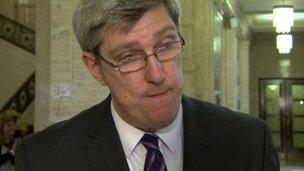All change for GCSE examinations
- Published

More students could get unexpected results this year
So far, the GCSE exams in England and in Northern Ireland have kept pace.
However, from this year they will diverge dramatically, and may even have different names.
Knowing that Education Secretary Michael Gove was about to radically revamp GCSEs, Northern Ireland's exams body, the CCEA, followed one of his reforms.
It is offering, for the first time in many years, additional marks for punctuation, spelling and use of grammar in a select number of subjects namely English literature, history, geography and religion.
There the similarities end, at least for the time being.
The next GCSE exams in England will scrap the modules which allow pupils to be examined in chunks.
The August 2013 results are the final ones in England to reflect modular testing.
Pupils who choose an English exam board in 2014 will only be tested at the end of their studies in system called a linear GCSE.
In Northern Ireland, however, the pupils using the local exam board, the CCEA, will continue to choose either modular or linear.

John O'Dowd is still considering the future of GCSE in Northern Ireland
August will also see the publication of the first results of new, tougher, English exams in the sciences.
In Northern Ireland, 72% of exams are taken with the local exams' board, the CCEA.
However, the start of a whole programme of changes in England will prompt many of them to reconsider whether they continue to use non-Northern Ireland exam boards.
Some schools believe the modular style suits their pupils better and may abandon the English boards to give CCEA their custom.
The current, and proposed, changes have meant the CCEA ceasing to sell its exams in England, because the modular GCSEs it offers in Northern Ireland will not be permitted in England and it would not be cost-effective to offer two different styles of exam.
In the future, Northern Ireland's system may also change but the education minister has already said he will not move to a completely linear structure, which has one exam at the end of the course, instead of a series of tests over two years.
A consultation ordered by Education Minister John O'Dowd ended in May and he is still considering the future of GCSEs in Northern Ireland.
Wales and Northern Ireland have both resisted Michael Gove's total reforms.
They have complained about his cavalier attitude to making changes without reference to the other two regions which share the name of the GCSE exam.